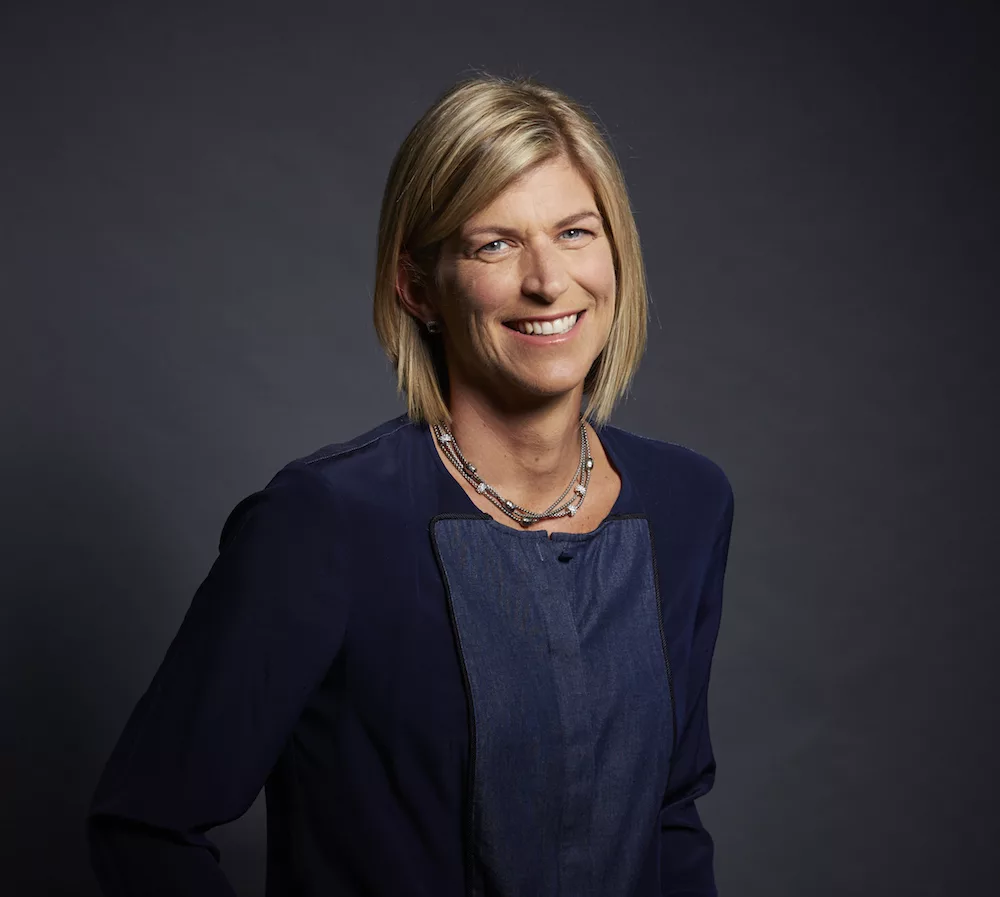“I’ve always been heavily engaged in the environment and cared deeply about it from a young age,” says Letitia Webster, global vice president of corporate sustainability for apparel conglomerate VF Corp.
After graduating Bowling Green State University in 1994 with a minor in environmental policy, Webster moved from Ohio to Colorado, where her love affair with the great outdoors grew deeper. She worked as a river raft guide and ski instructor, while taking part in multi-stakeholder campaigns to protect the state’s natural resources. Her work brought her together with fellow environmentalists, as well as developers and government officials.
The experience was fulfilling, Webster says, but balancing community and environmental needs with the push for commercial development was often frustrating. “Frankly, the environmentalists would get beat up by the developers,” she recalls of community meetings where she and her cohorts pled their case. “The financial argument won out almost every time, no matter how much data we had. I learned the hard way in Telluride that the environmental movement and the scientific argument were not enough to move the needle.”
As her mindset shifted, Webster began to see the benefit in marrying the needs of private industry and the preservation of communities and the environment. “Bringing those two perspectives together is what creates change,” she says. In 2000, she moved west to San Francisco and landed a job as marketing director of The North Face, one of VF Corp’s most popular brands, where she kickstarted the company’s sustainability and outdoor participation program. Eleven years later, she took the lead on sustainability for all of VF Corp, which also includes apparel and outdoor labels like Timberland, Vans, and Wrangler.
“Coming to VF, I was able to bring that environmental science background to a much more commercial-facing point of view,” Webster says. “Business is a significant change agent, but in order for sustainability to work for business, it has to make smart business sense.”
Today, Webster is a staunch advocate for the role of business in creating a better world. “I’m not saying change doesn’t happen on the individual level or at the government policy level. It does. But when you can change the way business operates, you illustrate a value proposition with the potential to shift entire markets — which can fundamentally change how we do things.”
Conscious Company sat down with Webster to find out more about her role at VF Corp, how a multinational conglomerate can rethink its operations, and why more companies should do the same.
VF Corp At A Glance
- Location: Greensboro, NC (global HQ)
- Founded: 1899
- Employees: 65,000
- Traction: $11.8 billion annual revenue; more than 20 brands in the portfolio; 5 brands that exceed $1 billion in annual revenue; operations in 170 countries; 1,500+ owned retail stores worldwide; #1 producer of backpacks worldwide; #1 producer of denim jeans worldwide; 1.4 million units of apparel and footwear produced every day
- Impact: achieved 12% carbon reduction from 2009 to 2015; set a goal to power all owned and operated facilities globally with 100% renewable energy by 2025; 14 of 33 distribution centers have achieved zero waste status (seven each in the U.S. and the EMEA region); 11 buildings are LEED Certified by the U.S. Green Building Council; 30,000 lives directly impacted through VF’s “Sustainable Living Environments” program benefitting apparel industry workers and their communities around the world; 76,000 lbs of apparel and footwear collected through the Vans, Timberland and The North Face Takeback Programs
- Recognition: Named one of the “World’s Most Ethical Companies” by Ethisphere Institute; named one of “America’s Most Just Companies” by Forbes and Just Capital; named a “Best Place to Work for LGBT Equality” by the Human Rights Campaign and its Corporate Equality Index; named to Barron’s “100 Most Sustainable Companies” list; consistently ranked as one of the “World’s Most Admired Companies” by Fortune magazine
- Structure: For profit
You’ve been at the helm of corporate sustainability at VF Corp for seven years. How has the company’s approach to sustainability evolved, and what makes you most proud about where you are on your journey?
Letitia Webster: I always say that in order for sustainability to work, it has to be a team sport. The sustainability team or the responsible sourcing team can’t be the only ones who own it. Every single person has to be engaged in a company’s sustainability mission and embed it into their day jobs.
Lately I’m most excited to receive emails in which entire teams are starting to run with sustainability ideas. When I see teams talking about a certain strategy or suggesting a new focus, I just think, “They’re doing it!” I didn’t have to poke and prod and beg. The teams are taking it on themselves, and they’re feeling empowered and motivated enough to own their part in our sustainability journey.
That’s when I think that everything we’ve been talking about for years is coming to fruition, because the associates are the movement-makers. They’re the ones who will actually make the change, embrace sustainability in the long term, and make it relevant to the business.

VF Corp prides itself on ethical manufacturing. Its manufacturing employees receive full VF Corp benefits, and its plants are designed with the environment in mind. This garment manufacturing facility in Yucatan, Mexico, for example, uses an intense purification process to return clean water to local aquifers. (Image courtesy of VF Corp)
How did VF Corp manage to engage a global team in its sustainability efforts, and how can other companies do the same?
LW: Never underestimate the power of continual engagement and continual conversations. We’ve been at it for a long time, and we’ve been able to show some wins and highlight some success stories from brands across the company. Those bright spots put momentum behind us, and people start to wonder, “If that team can do it, why can’t I?”
Launched at the end of last year, VF Corp’s Made for Change strategy further embedded sustainability in every facet of the business. We brought so many people into conversation to develop that strategy, and the ripple effect was massive in terms of engagement. We landed on something that’s really exciting, and I hope it will inspire our teams to see where they can add value.
Tell us more about VF Corp’s new sustainability strategy, Made for Change. Where did the idea come from, and what did you learn during development?
LW: Our 1.0 strategy was all about people, product, and planet. It was a very simple approach to get people comfortable with the idea and start to build those muscles. We focused on fundamental metrics like cost reduction, resource efficiency, and risk mitigation in order to demonstrate the business case and get our house in order.
As we started to achieve some of our goals, we realized the world was changing, and we needed to change and evolve with it. That meant walking outside the house and thinking about the broader impact we have on society. As we started asking tough questions about how to make VF thrive in today’s dynamic landscape, we knew we had to not only solidify the sustainability of our company, but also help our industry become more sustainable. That sort of transformation has to happen from a point of view of value creation.
Made for Change was designed as a long-term strategy for the business — not just a sustainability strategy — so it had to create value. If we want the plan to generate value in the form of revenue, reputation, brand relevancy, and growth, it must be embedded in the business. That required us to work closely with brand teams and leaders, who came together in an integrated process over two years to help us create our strategy. The process fundamentally changed the way we approach our work. Through that work, we hope to create large-scale impact and help the industry transform along with us.

Employees from VF Corp’s global headquarters in Greensboro, North Carolina — including Chief Financial Officer Scott Roe (pictured) — volunteer with local nonprofits on Earth Day 2015. (Image courtesy of VF Corp)
What do people most often misunderstand about what you do?
LW: Some people think I’m the girl who goes around making sure lights are turned off and recyclables go in the right bin. They don’t see sustainability as an innovative growth driver for the business. As a company, we started to unpack that and help people understand sustainability as a rich area for innovation.
Environmental solutions can have significant benefits for the business and for the consumer. At times, sustainability is a constraint. But it’s a constraint that offers opportunity for new ways of thinking in product design, material development, and other basic business functions. As we move from a linear model to a circular model, for example, the innovative thinking there will transform our business and our relationship with our consumers and our product.
When you put a lens of sustainability innovation on the private sector, the world looks differently and you can see a whole new set of opportunities. Business has the ability to innovate around issues like climate change, sustainable agriculture, and soil health — and in doing so they can create tremendous value for society. If we didn’t have that kind of constraint, we wouldn’t be asking these questions.
What are your top three pieces of advice for sustainability professionals or other business leaders who want to create positive change within their organizations?
LW: Collaboration is paramount. Sustainability professionals can get stuck in their own ways of thinking, so it’s important to be open. Make an effort to understand what’s happening elsewhere in the business. Learn about the marketplace and consumer challenges, and collaborate with other team leaders to develop pragmatic solutions.
Listening is key to getting people engaged, but as a leader focused on sustainability and social impact, you have to know when to make the case. Follow the momentum. People love bright spots and success stories. When talking to your peers, find those early wins and highlight those proof points for the work you do.
And talk about your work publicly, too! Don’t be afraid of not being perfect. No one expects you to be, but they do want to know you’re making progress. External stakeholders, from consumers and NGOs to governments, want to know that you’re aware of your issues as a company and are working on them. It’s up to you to find those sweet spot opportunities where your business can improve and add value — and to tell the story of how you got there.

Employees from a VF Corp garment manufacturing facility in Yucatan, Mexico, clean up the playground at a local preschool as part of VF Day, an annual employee volunteering event. (Image courtesy of VF Corp)
What’s the best piece of leadership advice you’ve ever received?
LW: Leaders define a culture. They define a way of work and the behaviors of your teams. That cannot be understated. As we work through the complex challenges we face as business leaders, the most important thing we can do is respect one another.
Everyone brings a different perspective to the table. We as leaders need to embrace that. We need to make sure everyone in our organization has a voice — even if their perspectives are different from ours or different from what we hoped. The more perspectives we include, the stronger our businesses and indeed our societies will be. As leaders, we need to own our role in facilitating inclusion and creating a culture that brings everyone into the conversation.
We often talk about leadership as a series of teachable moments. What’s a big lesson concerning this work that you learned the hard way?
LW: When I started out, I struggled with impatience, and I see this often with other young professionals. As sustainability practitioners, we don’t want to give up the sense of urgency. We know the world is changing, and we know we have to act. But you have to be patient enough to learn about the differing perspectives around issues you care about. Otherwise, you won’t have the right conversations or develop the right solutions.
Rather than trying to charge forward based on urgency alone, you need to be strategic. Allow the process to unfold, and trust that if you bring the right people together around the right questions, you will get an answer that’s meaningful. Sometimes we push so hard and so fast that we create unforeseen problems and make things harder than they have to be.
What gives you hope right now?
LW: It’s so easy to get depressed by the news and all of the problems in the world, but progress is being made.
We’re over the awareness hump. People know about the challenges we face. We’ve gone through the depression stage. We’ve thrown up our hands and wondered what we could possibly do. Now, we’re starting to come out the other side. People today are saying, “No, we can do this. We can solve these problems. We define our path.”
If we think only about death and destruction, the world will fall apart. But if we have a vision of sustainable, vibrant, thriving communities, that’s the direction we’ll go. I’m optimistic about how people, communities, companies, and governments are coming together to take us there, and I think we will be fine. We just have to keep it up.





